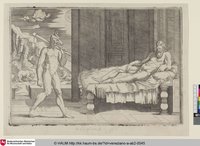
"In Greek mythology, Lycaon (/laɪˈkeɪɒn/; Attic Greek: Λυκᾱ́ων, Attic Greek: [ly.kǎː.ɔːn]) was a king of Arcadia who, in the most popular version of the myth, tested Zeus' omniscience by serving him the roasted flesh of Lycaon's own son Nyctimus, in order to see whether Zeus was truly all-knowing.
In return for these gruesome deeds, Zeus transformed Lycaon into a wolf and killed his offspring; Nyctimus was restored to life.
Despite being notorious for his horrific deeds, Lycaon was also remembered as a culture hero: he was believed to have founded the city Lycosura, to have established a cult of Zeus Lycaeus and to have started the tradition of the Lycaean Games, which Pausanias thinks were older than the Panathenaic Games. According to Gaius Julius Hyginus (d. AD 17), Lycaon dedicated the first temple to Hermes of Cyllene." - (en.wikipedia.org 12.08.2021)
![[Lykaon wird in einen Wolf verwandelt; Lyncus en loup-cervier]](/data/nds/resources/images/202009/200w_000001-5f583e1aa9792.jpg)


![[Lykaon wird von Zeus zur Strafe in einen Wolf verwandelt]](/data/nds/resources/images/202009/200w_000001-5f585a383c850.jpg)
![[Jupiter verwandelt Lykaon in einen Wolf; Lycaon changé en loup]](/data/nds/resources/images/202009/200w_000001-5f581a2131361.jpg)